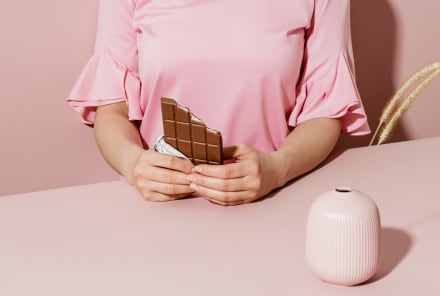Advertisement
Should You Take CoQ10 In The Morning Or At Night? Experts Answer


With so many supplements to choose from, it's easy to fixate on which nutrients can best support your body and fill the gaps in your diet. But sometimes, when you take said nutrients and bioactives is just as important. Such is the case for coenzyme Q10 (CoQ10), a supplement with potential effects that may dictate the best timing in your nutrition routine.
If you're currently taking the supplement (or thinking about trying it), you might wonder when you should take CoQ10: morning or night. Here's what the experts recommend, plus tips for figuring out the right time slot for you.
What is CoQ10 & what are its benefits?
CoQ10, also called ubiquinol (the bioactive form) or ubiquinone, is a fat-soluble coenzyme1 that's found in every cell in your body. CoQ10 resides in the mitochondria of these cells, and its main job is to help convert nutrients from food into adenosine triphosphate (ATP), otherwise known as our cellular energy currency.* CoQ10 is also a key regulator of cellular autophagy (cleanup) and rejuvenation.*
Your body naturally makes CoQ10, but your levels drop as you get older2; this might actually contribute to the development of chronic conditions with age3. Along with supplements, you can also consume CoQ10 from food, like all meats (but especially organ meats and fatty fish), nuts, seeds, and certain vegetables like broccoli.
CoQ10 is also a major antioxidant throughout the body, meaning it targets and neutralizes free radicals4, aka molecules that are normal byproducts of cellular activities and metabolism, or through exposure to sources like diets, UV radiation (photoaging), air pollution, cigarette smoking, and pesticides. CoQ10 can even help regenerate other antioxidants, like vitamin E and vitamin C.* Pretty cool, right?
Thanks to these stellar and multifunctional abilities, the health support areas for CoQ10 are aplenty:*
- Neutralizes oxidative stress.* Perhaps the most impressive is that it can combat oxidative stress4, which does a number on the body.* Oxidative stress is what happens when the cells in your body are dealing with too many free radicals. Over a prolonged period of time, this accelerates the aging process.
- Cellular energy and mitochondrial support.* CoQ10 is used to help promote energy, according to Casey Kelley, M.D., ABoIM, founder and medical director of Case Integrative Health.* This is because of this essential coenzyme's vital role in mitochondrial health and cellular bioenergetics (i.e., producing ATP from food).* Ilene Ruhoy, M.D., an integrative neurologist, says that CoQ10 is a mainstay for mitochondrial health because "coenzyme Q10 carries the electrons that are needed to make the complex chain of enzymes work."*
- Supports healthy skin.* Due to its potent antioxidant properties, CoQ10 is a bioactive ingredient that can help support skin and reduce signs of aging.* Oxidative stress is a huge driver of premature aging, and photoaging (from sun exposure) is a real-time example of this. "The protective antioxidant effects of CoQ105 have been demonstrated in human keratinocytes and fibroblasts, major types of cells essential for skin health," explains Ashley Jordan Ferira, Ph.D., RDN, mbg's director of scientific affairs. "Furthermore, CoQ10 supplementation6 has been clinically shown to improve skin elasticity and smoothness while reducing wrinkles and fine lines."*
When is the best time to take CoQ10, morning or night?
Currently, there's no published research stating the exact time someone should take CoQ10 for optimal benefits. However, when considering how the body processes and responds to CoQ10, experts generally suggest the morning.
Here's why: As mentioned earlier, CoQ10 may have an energizing effect on some people.* This makes it more fitting for the a.m., when you've got things to do and places to be. Taking it earlier in the day can also help you avoid sleep disruption later, as a later dose may be counterproductive for sleep in some individuals, notes functional medicine practitioner Bindiya Gandhi, M.D. This is especially important to keep in mind if you're already prone to restlessness at night.
Plus, CoQ10 is best taken with food (more on that below). The morning offers a convenient opportunity to do just that, as you can take it with—or near—breakfast.
But of course, everyone is different, and there are some scenarios where taking CoQ10 at night might make more sense. For example, if CoQ10 doesn't mess with your sleep quality, you can get away with a bedtime dose, says naturopathic physician Tricia Pingel, NMD. Or "if CoQ10 gives you an upset stomach when [taken] with food, [take] it at the end of the day" after you're done eating, recommends Kelley. Side effects, such as stomach upset, are very rare with CoQ10 supplementation.
CoQ10 may interact with certain medications. In this case, if you take said meds in the morning, "you may need to move CoQ10 to lunch or dinnertime," notes Pingel.
Should it be taken with other supplements or with food?
If your wellness routine includes a B complex, pair it with CoQ10, suggests Pingel. The body requires vitamins B5 and B6 to produce CoQ107, so inadequate intake of these essential water-soluble B vitamins can contribute to poor CoQ10 status, she notes.
And B vitamins are not immune to nutrient gaps. As mbg's Ferira explains, "People typically think of vitamin B12 when it comes to nutrient gaps in the B-vitamin family, but in fact, almost 10% of American adults consume inadequate B68 on the daily. That's three times higher than the prevalence of insufficient B12 consumption."
More importantly, take your CoQ10 with a meal for top-notch absorption. "Take the supplement with food, particularly fatty foods, as it's fat-soluble," explains Kelley. "Avocados, olive and coconut oils, whole eggs, salmon, or nuts [are] great partners for CoQ10." Or take it with your morning smoothie during breakfast. "Don't overthink it. Most healthy meals or snacks will have some fat content, and that will naturally support the absorption of fat-soluble bioactives like CoQ10," says Ferira.
While we're on the topic of CoQ10 pairings, it's worth mentioning what shouldn't be taken with CoQ10. The supplement is associated with few drug interactions, but it can potentially interact with blood-thinning medications (i.e., warfarin, because CoQ10 may contribute to normal blood clotting) and blood pressure medications (because CoQ10 can reduce blood pressure). If you're on these medications or any medication, for that matter, always work with your health care practitioner before adding CoQ10 to your rotation, or they can help recommend how to space the timing of your medications versus supplements.
What is the proper dosage?
According to Kelley, there's no one-size-fits-all dosage for CoQ10. As Ferira explains, "Because your body can technically synthesize CoQ10 endogenously, it's not considered an 'essential' nutrient, and thus, there's no established Recommended Dietary Allowance." With that said, she also shared that "most clinical research on CoQ10 is at the 100-milligram dose or higher."
Your proper dosage depends on several factors. This includes the health support area you're trying to affect, as well as your age, notes Kelley. It also depends on your baseline CoQ10 intake and status and the dosage that's needed to normalize them, adds Pingel.
If you do have specific concerns or needs, your doctor can suggest the best dosage and frequency for your situation. You can find the milligrams of CoQ10 per serving on the label of your supplement. While you're at it, look for CoQ10 in the bioactive form of ubiquinol instead of ubiquinone. Ubiquinol is proven to be more bioavailable, "meaning the portion of CoQ10 [that circulates in the body] will pack a larger punch," says Kelley.*
Conclusion.
There's no standard guideline for the best time to take CoQ10. However, the general rec is to take CoQ10 in the morning with a meal, due to its potential energizing effects.* But like all supplements, CoQ10 isn't one-size-fits-all—so it's possible that a later-in-the-day dose might work for you. Consider how your body responds to CoQ10, along with your specific needs and lifestyle.
8 Sources
- https://www.ncbi.nlm.nih.gov/books/NBK531491/
- https://pubmed.ncbi.nlm.nih.gov/25126052/
- https://www.ncbi.nlm.nih.gov/pmc/articles/PMC4112525/
- https://www.ncbi.nlm.nih.gov/pmc/articles/PMC7660335/
- https://www.ncbi.nlm.nih.gov/pmc/articles/PMC6213755/
- https://pubmed.ncbi.nlm.nih.gov/27548886/
- https://www.ncbi.nlm.nih.gov/pmc/articles/PMC6627360/
- https://www.ncbi.nlm.nih.gov/pmc/articles/PMC5579642/



















